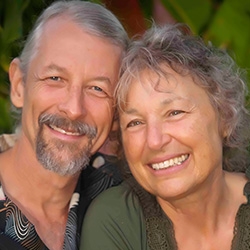
NVC Resources on Empathy
-
Ingrid guides parents to navigate everyday parenting challenges using the NVC model, such as the behavior of a frustrated child, a messy room, transition times and a child who collapses when things don't work out as she had hoped.
-
How can you remember to use the skills and consciousness of NVC in the heat of the moment?
Jim and Jori Manske will show you how in these recordings from their 2018 course!
They teach that when and how you address the conflicts that emerge in your everyday life matters! By slowing down and considering the state of your resources before engaging in a conflict, you increase the likelihood of discovering a solution that dissolves separateness and enhances the connection and compassion you long for.
-
When we're on the receiving end of pain-stimulating assumptions, a microaggression, or prejudice --when we're reactive and resultingly have self-doubt, guilt or shame in ourselves-- is it possible to be intensely authentic while holding care for everyone in the situation? Can we effectively do this even as a third party witnesses to these things? Self-empathy, empathy, and a commitment to authenticity have become essential tools I need to keep sharpened in my toolbox if I am to show up and do the work I value in this world.
-
Ask the Trainer: "I'm part of a small, self-led NVC group that's been working together for almost two years. We are experiencing some growing pains in that we're still not certain how and under what circumstances to make requests, especially negative ones."
-
Conflict is a normal and natural part of life. To varying degrees, it happens whenever two or more people consistently spend time together. Resolving conflict effectively and peacefully, in a way in which all parties feel respected and valued, does not feel natural for those of us who grew up with punitive, adversarial, or avoidant approaches to conflict. Eric offers some tips for approaching conflict.
-
Trainer Tip: Instead of trying for perfection, let’s try safe experimentation: Acknowledge that whenever we try a new behavior, it’s bound to take us a few times before we get it right. Read on for how we can do this. We'll use learning empathy as an example.
-
Ask the Trainer: "I have noticed that sometimes when I am in a story-telling mood I am usually trying to prove that I am right and once I connect with a need the urge to give all the information goes away."
-
How we treat ourselves when we fall short of our own ideals, desires and hopes can profoundly affect the quality of our lives. Learn how to identify your triggers and reactions, to mourn falling short, and to practice self-connection and self-empathy.
-
One thing that makes empathic understanding difficult yet valuable is that it can be humbling. If I really open myself to hearing and understanding, while trusting my inner strength of self-knowing, I may be changed by what I hear. My core beliefs or understanding might change and grow. This openness could be key to transforming the energy of conflict into new possibilities for greater connection, creativity, and well-being.
-
Join CNVC Certified Trainers and Mediators Jori and Jim Manske in an exploration of using Nonviolent Communication in the context of Mediation and Conflict Resolution.










